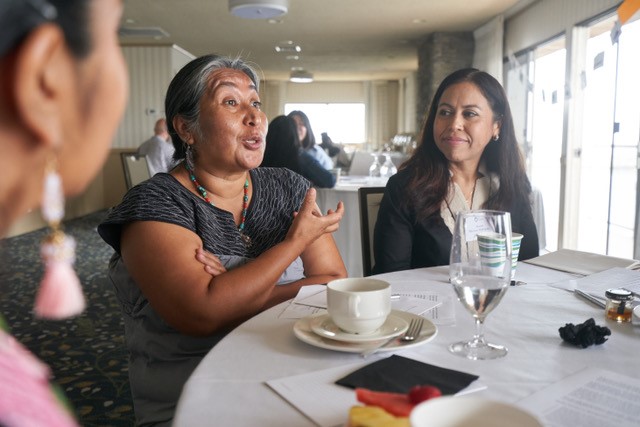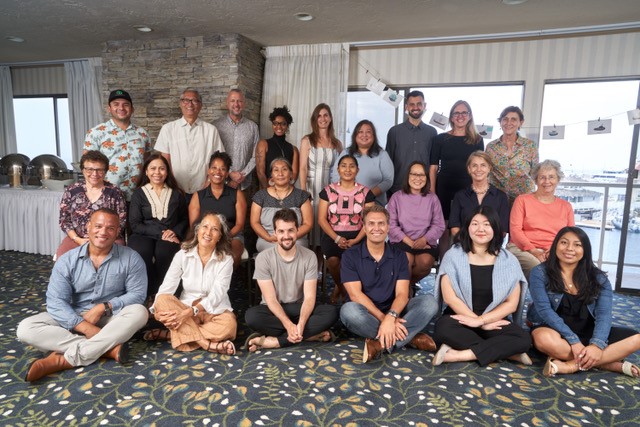Showing Up and Sharing Power: How One Foundation Board Deepened Relationships with its Nonprofit Partners Through Trust-Based Conversations

Photo from the Durfee Foundation Board Retreat
This article was originally published by Trust-Based Philanthropy Project and is re-posted here with permission.
Leadership at the Durfee Foundation wanted to break down the traditional barriers between foundation trustees and nonprofit partners.
Why do you do what you do?
What led you to create a community-based startup organization?
Has there been a huge surprise along the way so far—good, bad, or wow?
Is there a question you are hoping we’d ask, but haven’t?
These are some of the questions that the Durfee Foundation trustees asked a group of community leaders in small conversations at a recent board retreat. Through its Springboard Program, Durfee funds young organizations in their first five years. Durfee provides them with general operating support and a mentor, an experienced alum from our Sabbatical or Stanton Fellowship Programs, to work closely with the Springboard leader as they navigate program development, fundraising, board relationships, strategic planning and more.
Foundation staff set up four tables with 2-3 Durfee trustees and a Springboard leader and mentor. Trustees started by asking questions of the nonprofit leaders for 20 minutes. Staff gave them a list of questions they could use, but everyone was invited to ask whatever questions they wanted to.
And then we flipped the script.
Everyone stayed at their tables, but now the Springboard leaders and their mentors were invited to ask questions of the Durfee trustees. Leaders’ questions included:
What do you do when you’re not doing Durfee?
What have you learned as a trustee– and how does this learning happen?
Is it fulfilling, joyful, stretching, weird to be on a board with some family members and some who are not?
The groups moved around for a second round of Q and A with new partners. We all ate lunch together without an agenda.
While Durfee has long invested in grantee relationships and recognized the need to support organizations at critical moments in their lifetimes, including early-stage leaders, this way of coming together was new for our board. We worried that there might be awkward silences, misunderstandings, cultural disconnections, or hurt feelings. Instead, the conversations were candid, enlightening, and eye-opening, according to trustee feedback. As one grantee shared,
“I think that the partner conversation really humanized the experience of being a grantee and grantor. It removed the wall between the processes that we are used to when interacting with foundations and allowed us to learn more about each other and address the pressing questions such as why we do the work we do. It was also very helpful to have a two-sided conversation that allowed for us as grantees to ask questions and learn about each other.”
In other words, these were not typical grantee-trustee interactions.

Photo of the Durfee Foundation Board Retreat
This is just the beginning.
These trust-based conversations were a great start, a way for the Durfee board to experience the depth of the relationships that Durfee’s staff enjoys with its partners. The participants were present, curious, and engaged in meaningful conversation. Trustees learned something about how the foundation is perceived, and how it can best support nonprofits. Most important, nonprofit partners and trustees were able to connect as people. That matters because in order to have an impact in our communities, we need strong relationships, and those are built on trust.
Things to consider for supporting trust-based conversations
We pulled together a list of things we learned from this experience, in case these are useful to others who interested in hosting similar conversations.
- To the extent possible, don’t make this feel like a command performance that the nonprofits must show up for to get continued funding or favor. The best way to ensure this is to share Trust-Based Philanthropy values and practices in the invitation. This is a critical step to set expectations and tone for individuals who are participating in a trust-based conversation for the first time.
- Be transparent about why you are doing this, and what your goals are.
- Pay your nonprofit partners. Each nonprofit participant received a stipend of $1,000 for their time.
- Share bios of everyone participating in advance.
- Develop sample questions that participants can use at their discretion, and share those questions in advance. Let nonprofit partners bring their own questions to trustees, and see if there are questions that nonprofit leaders want to be asked by trustees.
- To help build deeper relationships, eat a meal together, or engage in another other social activity without an agenda.
- Thank attendees for their time and willingness to participate.
- Invite participants to share highlights to create collective space for learning, and survey them anonymously afterwards to see if you met your goals and if they have any advice for you.
This is not recommended for new practitioners of trust-based principles. We offer these suggestions for foundations who are doing the work of creating more trust-based and power-aware relationships across staff, board, and nonprofit partners. These same suggestions in an organization not already engaged in that deep work might do more harm than good. For more information and resources, please reach out to the Trust-Based Philanthropy Project.
Aurea Montes-Rodriguez is Executive Vice President at Community Coalition
Carrie Avery is President at The Durfee Foundation
The views and opinions expressed in individual blog posts are those of the author(s) and do not necessarily reflect the official policy or position of the National Center for Family Philanthropy.
